Strategic Decision-Making in Global Business: A SASOL Analysis
VerifiedAdded on 2023/06/14
|12
|3216
|316
Report
AI Summary
This report provides a comprehensive analysis of the global business environment, focusing on its influence on organizational culture, function, and structure, using SASOL as a case study. It evaluates how global operations have influenced SASOL and how the organization has adapted to operating in a global market. The report also explores Hofstede's dimensions of culture and evaluates the ethical and sustainable factors that organizations must consider in the global market. Furthermore, it critically evaluates strategic decision-making in relation to risk and diversification in a global context and assesses the range of strategic global expansion routes available to SASOL, providing insights into the challenges and opportunities of operating in an international business environment.
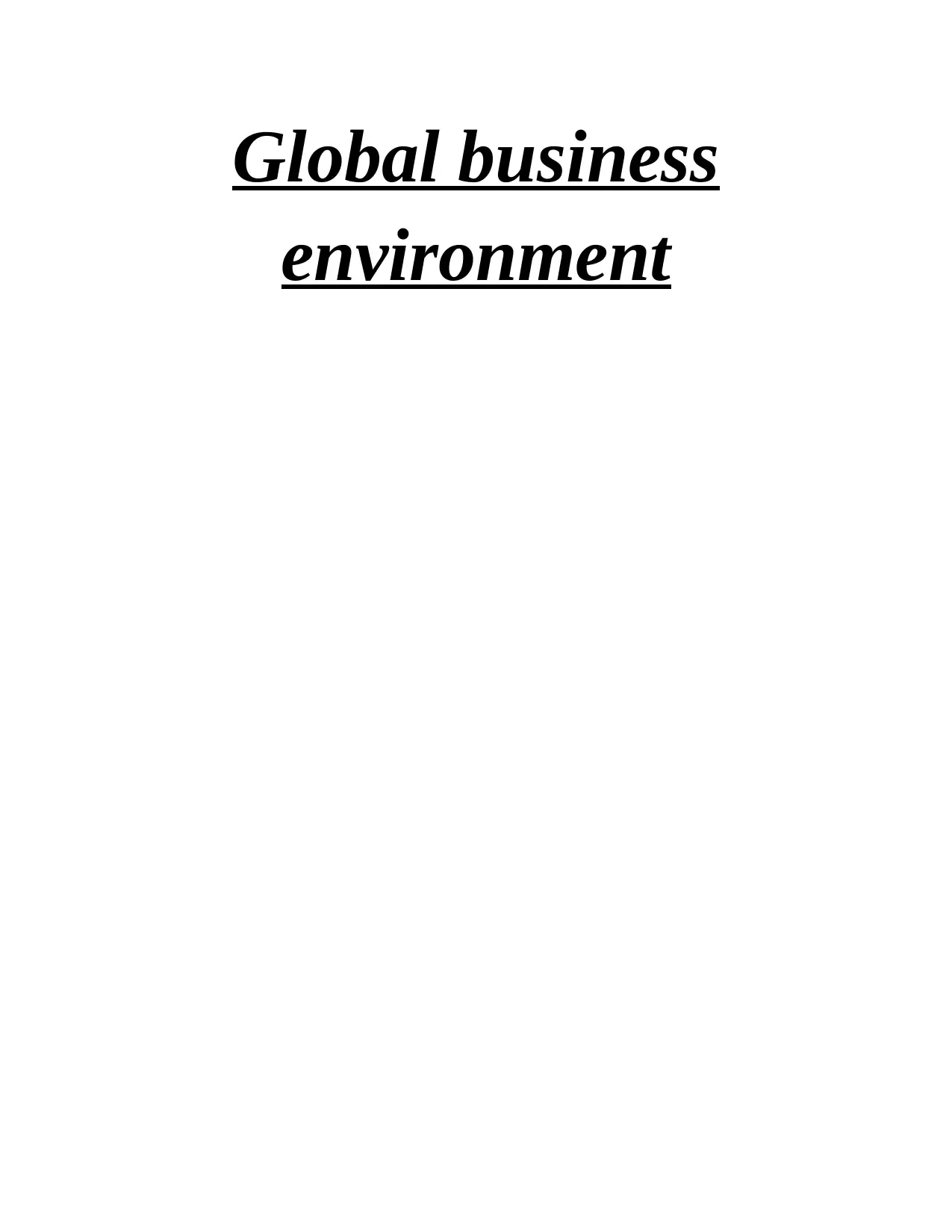
Global business
environment
environment
Paraphrase This Document
Need a fresh take? Get an instant paraphrase of this document with our AI Paraphraser
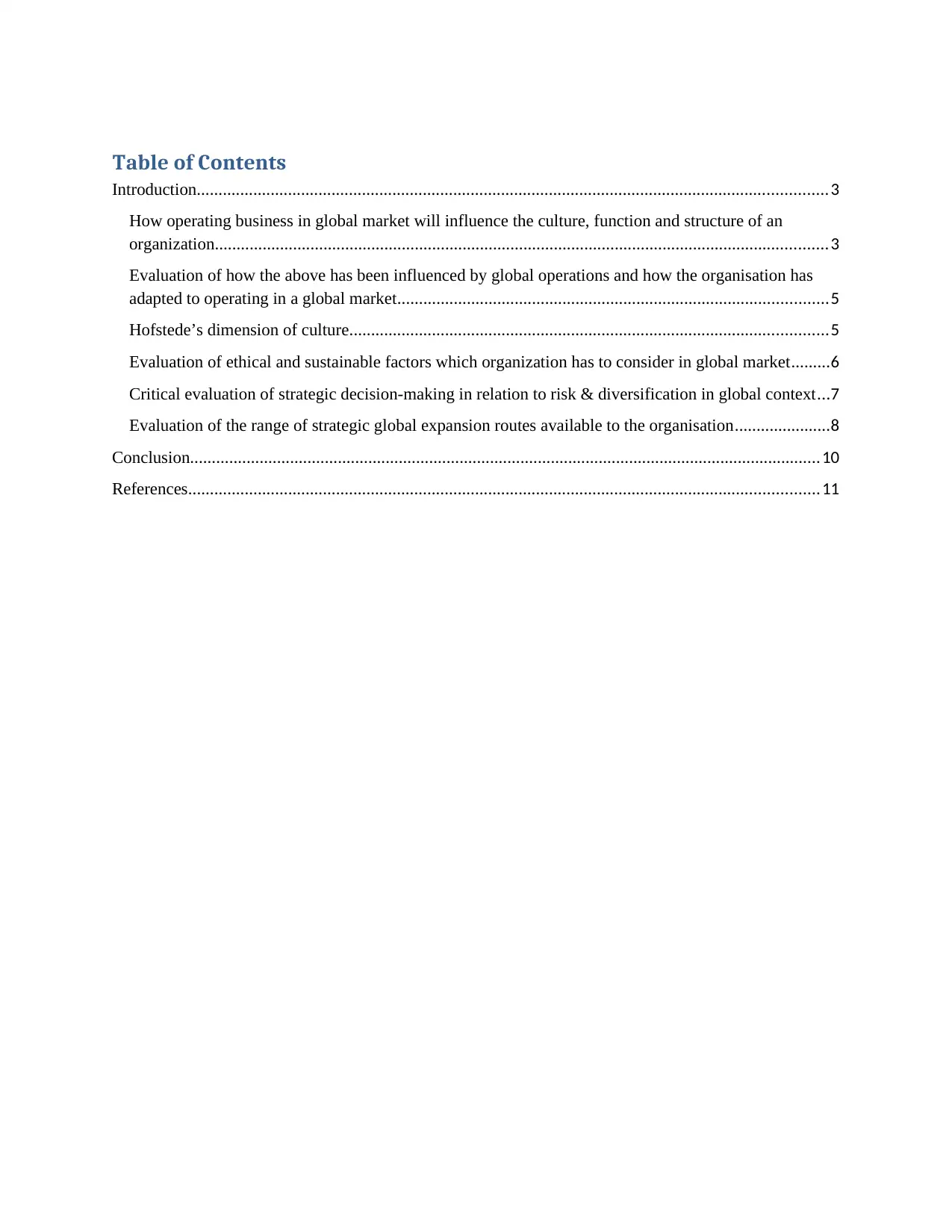
Table of Contents
Introduction.................................................................................................................................................3
How operating business in global market will influence the culture, function and structure of an
organization.............................................................................................................................................3
Evaluation of how the above has been influenced by global operations and how the organisation has
adapted to operating in a global market...................................................................................................5
Hofstede’s dimension of culture..............................................................................................................5
Evaluation of ethical and sustainable factors which organization has to consider in global market.........6
Critical evaluation of strategic decision-making in relation to risk & diversification in global context...7
Evaluation of the range of strategic global expansion routes available to the organisation......................8
Conclusion.................................................................................................................................................10
References.................................................................................................................................................11
Introduction.................................................................................................................................................3
How operating business in global market will influence the culture, function and structure of an
organization.............................................................................................................................................3
Evaluation of how the above has been influenced by global operations and how the organisation has
adapted to operating in a global market...................................................................................................5
Hofstede’s dimension of culture..............................................................................................................5
Evaluation of ethical and sustainable factors which organization has to consider in global market.........6
Critical evaluation of strategic decision-making in relation to risk & diversification in global context...7
Evaluation of the range of strategic global expansion routes available to the organisation......................8
Conclusion.................................................................................................................................................10
References.................................................................................................................................................11
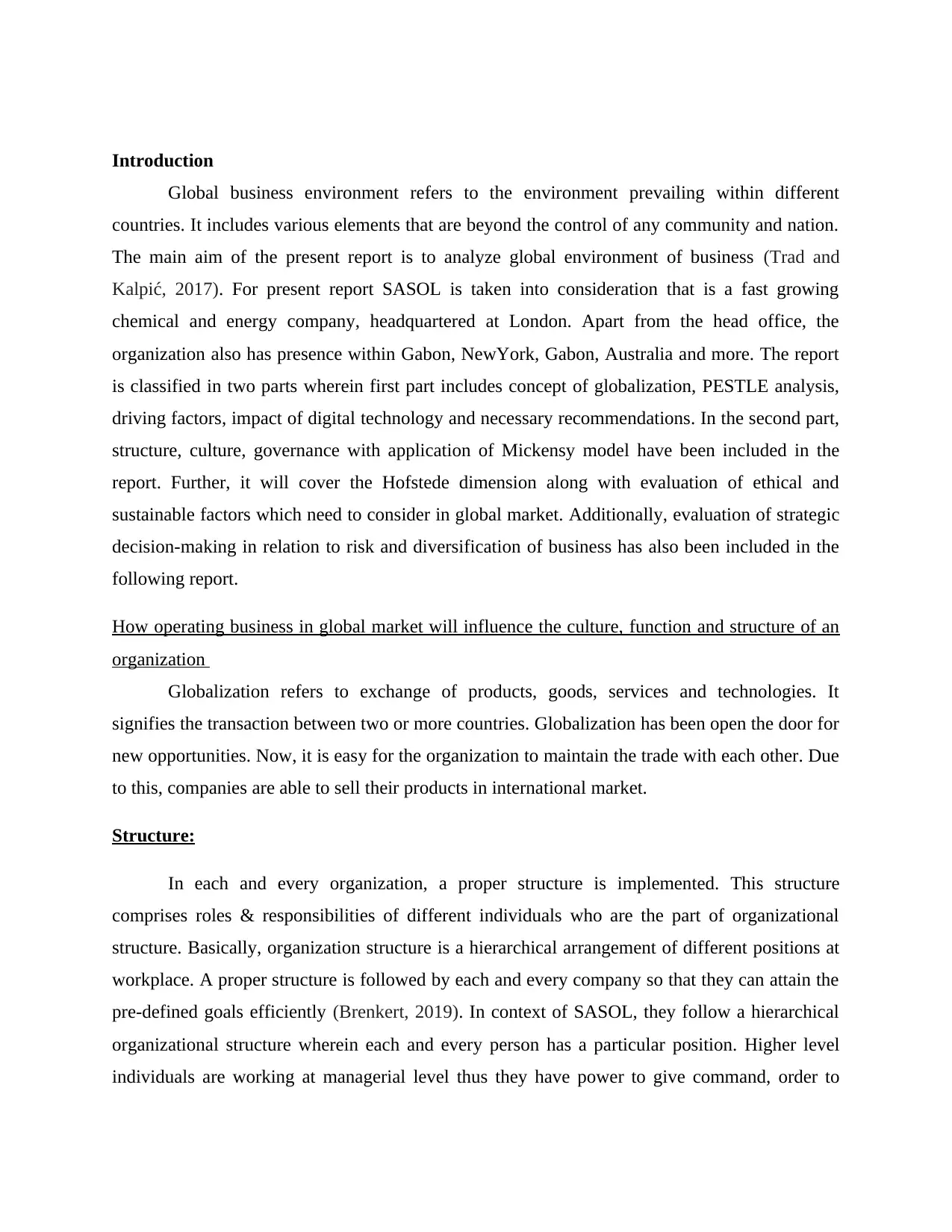
Introduction
Global business environment refers to the environment prevailing within different
countries. It includes various elements that are beyond the control of any community and nation.
The main aim of the present report is to analyze global environment of business (Trad and
Kalpić, 2017). For present report SASOL is taken into consideration that is a fast growing
chemical and energy company, headquartered at London. Apart from the head office, the
organization also has presence within Gabon, NewYork, Gabon, Australia and more. The report
is classified in two parts wherein first part includes concept of globalization, PESTLE analysis,
driving factors, impact of digital technology and necessary recommendations. In the second part,
structure, culture, governance with application of Mickensy model have been included in the
report. Further, it will cover the Hofstede dimension along with evaluation of ethical and
sustainable factors which need to consider in global market. Additionally, evaluation of strategic
decision-making in relation to risk and diversification of business has also been included in the
following report.
How operating business in global market will influence the culture, function and structure of an
organization
Globalization refers to exchange of products, goods, services and technologies. It
signifies the transaction between two or more countries. Globalization has been open the door for
new opportunities. Now, it is easy for the organization to maintain the trade with each other. Due
to this, companies are able to sell their products in international market.
Structure:
In each and every organization, a proper structure is implemented. This structure
comprises roles & responsibilities of different individuals who are the part of organizational
structure. Basically, organization structure is a hierarchical arrangement of different positions at
workplace. A proper structure is followed by each and every company so that they can attain the
pre-defined goals efficiently (Brenkert, 2019). In context of SASOL, they follow a hierarchical
organizational structure wherein each and every person has a particular position. Higher level
individuals are working at managerial level thus they have power to give command, order to
Global business environment refers to the environment prevailing within different
countries. It includes various elements that are beyond the control of any community and nation.
The main aim of the present report is to analyze global environment of business (Trad and
Kalpić, 2017). For present report SASOL is taken into consideration that is a fast growing
chemical and energy company, headquartered at London. Apart from the head office, the
organization also has presence within Gabon, NewYork, Gabon, Australia and more. The report
is classified in two parts wherein first part includes concept of globalization, PESTLE analysis,
driving factors, impact of digital technology and necessary recommendations. In the second part,
structure, culture, governance with application of Mickensy model have been included in the
report. Further, it will cover the Hofstede dimension along with evaluation of ethical and
sustainable factors which need to consider in global market. Additionally, evaluation of strategic
decision-making in relation to risk and diversification of business has also been included in the
following report.
How operating business in global market will influence the culture, function and structure of an
organization
Globalization refers to exchange of products, goods, services and technologies. It
signifies the transaction between two or more countries. Globalization has been open the door for
new opportunities. Now, it is easy for the organization to maintain the trade with each other. Due
to this, companies are able to sell their products in international market.
Structure:
In each and every organization, a proper structure is implemented. This structure
comprises roles & responsibilities of different individuals who are the part of organizational
structure. Basically, organization structure is a hierarchical arrangement of different positions at
workplace. A proper structure is followed by each and every company so that they can attain the
pre-defined goals efficiently (Brenkert, 2019). In context of SASOL, they follow a hierarchical
organizational structure wherein each and every person has a particular position. Higher level
individuals are working at managerial level thus they have power to give command, order to
⊘ This is a preview!⊘
Do you want full access?
Subscribe today to unlock all pages.

Trusted by 1+ million students worldwide
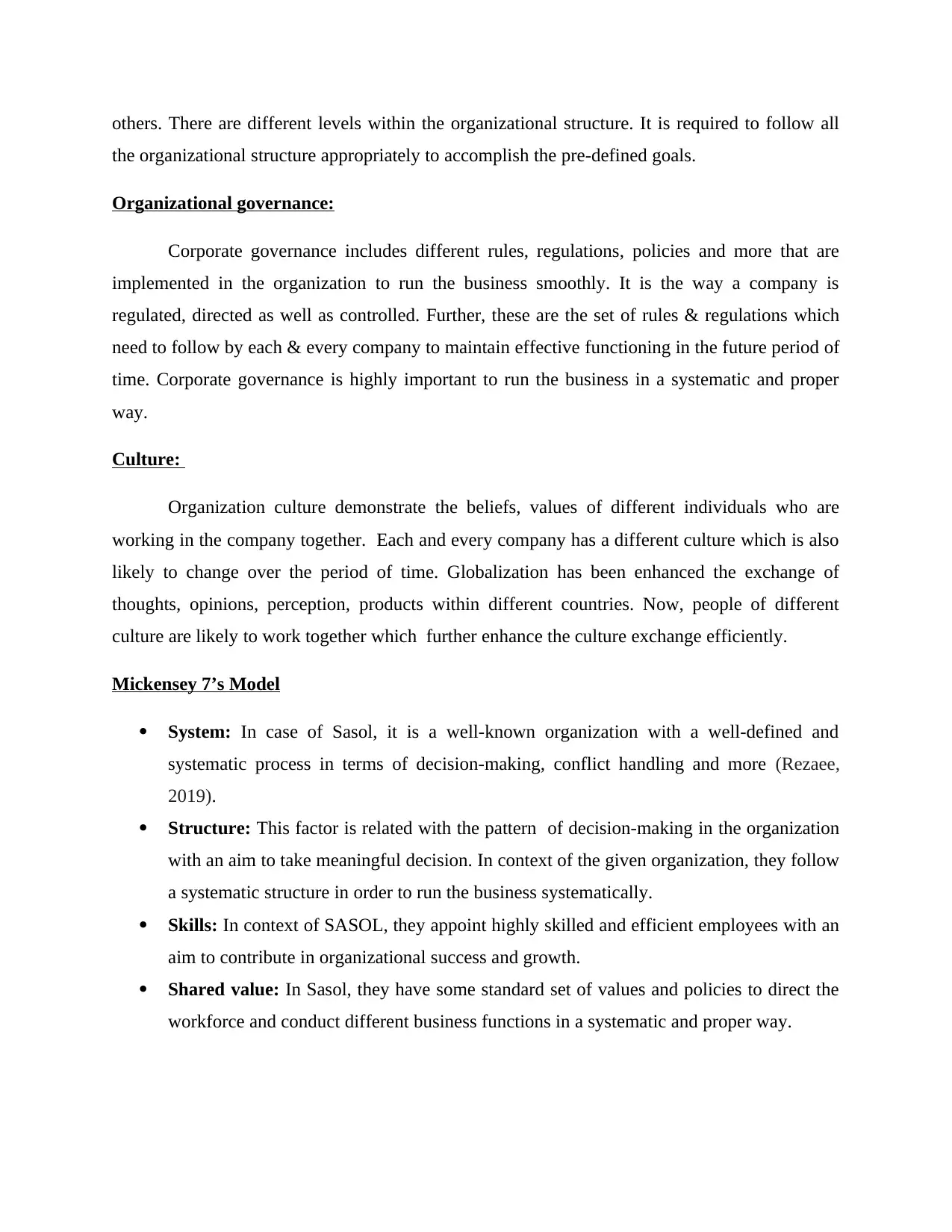
others. There are different levels within the organizational structure. It is required to follow all
the organizational structure appropriately to accomplish the pre-defined goals.
Organizational governance:
Corporate governance includes different rules, regulations, policies and more that are
implemented in the organization to run the business smoothly. It is the way a company is
regulated, directed as well as controlled. Further, these are the set of rules & regulations which
need to follow by each & every company to maintain effective functioning in the future period of
time. Corporate governance is highly important to run the business in a systematic and proper
way.
Culture:
Organization culture demonstrate the beliefs, values of different individuals who are
working in the company together. Each and every company has a different culture which is also
likely to change over the period of time. Globalization has been enhanced the exchange of
thoughts, opinions, perception, products within different countries. Now, people of different
culture are likely to work together which further enhance the culture exchange efficiently.
Mickensey 7’s Model
System: In case of Sasol, it is a well-known organization with a well-defined and
systematic process in terms of decision-making, conflict handling and more (Rezaee,
2019).
Structure: This factor is related with the pattern of decision-making in the organization
with an aim to take meaningful decision. In context of the given organization, they follow
a systematic structure in order to run the business systematically.
Skills: In context of SASOL, they appoint highly skilled and efficient employees with an
aim to contribute in organizational success and growth.
Shared value: In Sasol, they have some standard set of values and policies to direct the
workforce and conduct different business functions in a systematic and proper way.
the organizational structure appropriately to accomplish the pre-defined goals.
Organizational governance:
Corporate governance includes different rules, regulations, policies and more that are
implemented in the organization to run the business smoothly. It is the way a company is
regulated, directed as well as controlled. Further, these are the set of rules & regulations which
need to follow by each & every company to maintain effective functioning in the future period of
time. Corporate governance is highly important to run the business in a systematic and proper
way.
Culture:
Organization culture demonstrate the beliefs, values of different individuals who are
working in the company together. Each and every company has a different culture which is also
likely to change over the period of time. Globalization has been enhanced the exchange of
thoughts, opinions, perception, products within different countries. Now, people of different
culture are likely to work together which further enhance the culture exchange efficiently.
Mickensey 7’s Model
System: In case of Sasol, it is a well-known organization with a well-defined and
systematic process in terms of decision-making, conflict handling and more (Rezaee,
2019).
Structure: This factor is related with the pattern of decision-making in the organization
with an aim to take meaningful decision. In context of the given organization, they follow
a systematic structure in order to run the business systematically.
Skills: In context of SASOL, they appoint highly skilled and efficient employees with an
aim to contribute in organizational success and growth.
Shared value: In Sasol, they have some standard set of values and policies to direct the
workforce and conduct different business functions in a systematic and proper way.
Paraphrase This Document
Need a fresh take? Get an instant paraphrase of this document with our AI Paraphraser
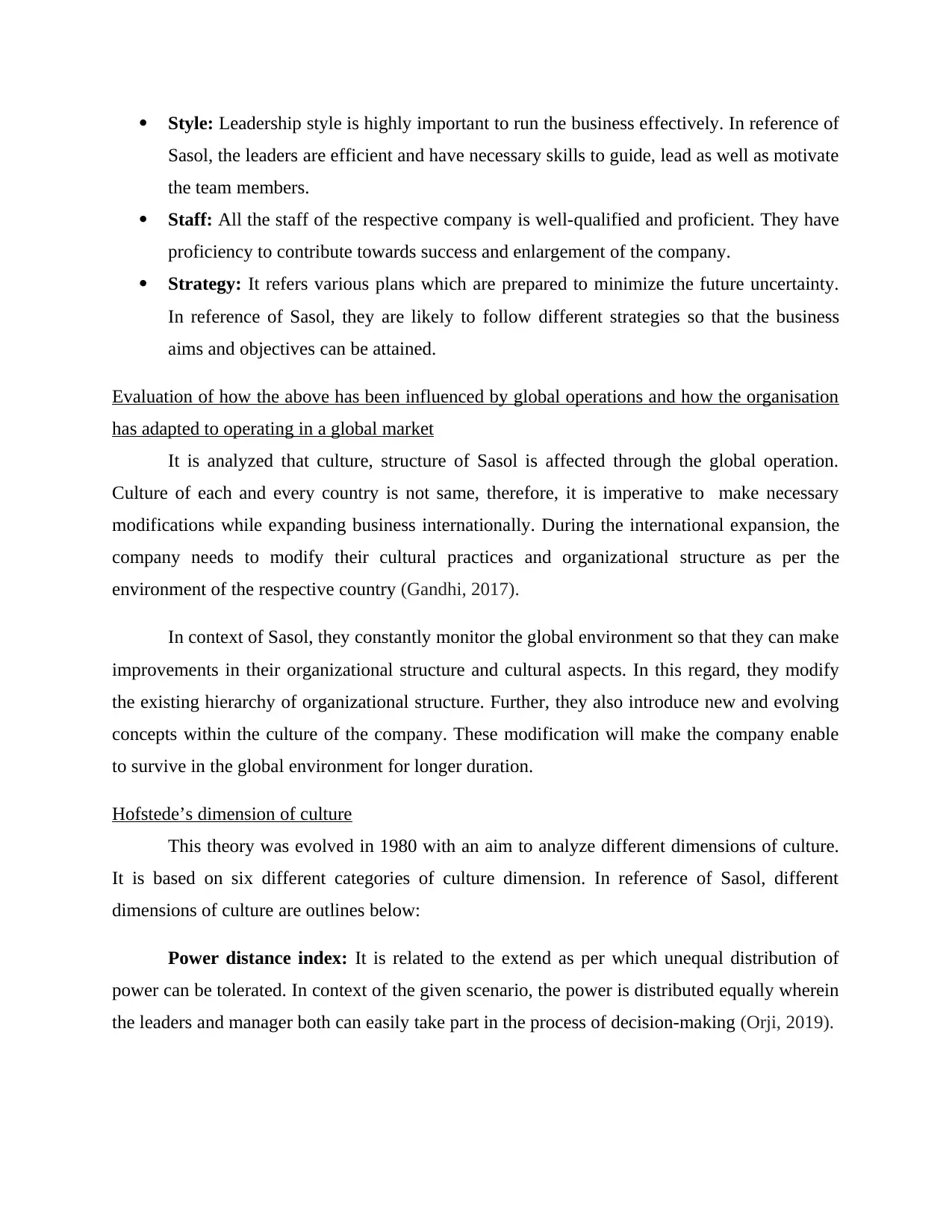
Style: Leadership style is highly important to run the business effectively. In reference of
Sasol, the leaders are efficient and have necessary skills to guide, lead as well as motivate
the team members.
Staff: All the staff of the respective company is well-qualified and proficient. They have
proficiency to contribute towards success and enlargement of the company.
Strategy: It refers various plans which are prepared to minimize the future uncertainty.
In reference of Sasol, they are likely to follow different strategies so that the business
aims and objectives can be attained.
Evaluation of how the above has been influenced by global operations and how the organisation
has adapted to operating in a global market
It is analyzed that culture, structure of Sasol is affected through the global operation.
Culture of each and every country is not same, therefore, it is imperative to make necessary
modifications while expanding business internationally. During the international expansion, the
company needs to modify their cultural practices and organizational structure as per the
environment of the respective country (Gandhi, 2017).
In context of Sasol, they constantly monitor the global environment so that they can make
improvements in their organizational structure and cultural aspects. In this regard, they modify
the existing hierarchy of organizational structure. Further, they also introduce new and evolving
concepts within the culture of the company. These modification will make the company enable
to survive in the global environment for longer duration.
Hofstede’s dimension of culture
This theory was evolved in 1980 with an aim to analyze different dimensions of culture.
It is based on six different categories of culture dimension. In reference of Sasol, different
dimensions of culture are outlines below:
Power distance index: It is related to the extend as per which unequal distribution of
power can be tolerated. In context of the given scenario, the power is distributed equally wherein
the leaders and manager both can easily take part in the process of decision-making (Orji, 2019).
Sasol, the leaders are efficient and have necessary skills to guide, lead as well as motivate
the team members.
Staff: All the staff of the respective company is well-qualified and proficient. They have
proficiency to contribute towards success and enlargement of the company.
Strategy: It refers various plans which are prepared to minimize the future uncertainty.
In reference of Sasol, they are likely to follow different strategies so that the business
aims and objectives can be attained.
Evaluation of how the above has been influenced by global operations and how the organisation
has adapted to operating in a global market
It is analyzed that culture, structure of Sasol is affected through the global operation.
Culture of each and every country is not same, therefore, it is imperative to make necessary
modifications while expanding business internationally. During the international expansion, the
company needs to modify their cultural practices and organizational structure as per the
environment of the respective country (Gandhi, 2017).
In context of Sasol, they constantly monitor the global environment so that they can make
improvements in their organizational structure and cultural aspects. In this regard, they modify
the existing hierarchy of organizational structure. Further, they also introduce new and evolving
concepts within the culture of the company. These modification will make the company enable
to survive in the global environment for longer duration.
Hofstede’s dimension of culture
This theory was evolved in 1980 with an aim to analyze different dimensions of culture.
It is based on six different categories of culture dimension. In reference of Sasol, different
dimensions of culture are outlines below:
Power distance index: It is related to the extend as per which unequal distribution of
power can be tolerated. In context of the given scenario, the power is distributed equally wherein
the leaders and manager both can easily take part in the process of decision-making (Orji, 2019).
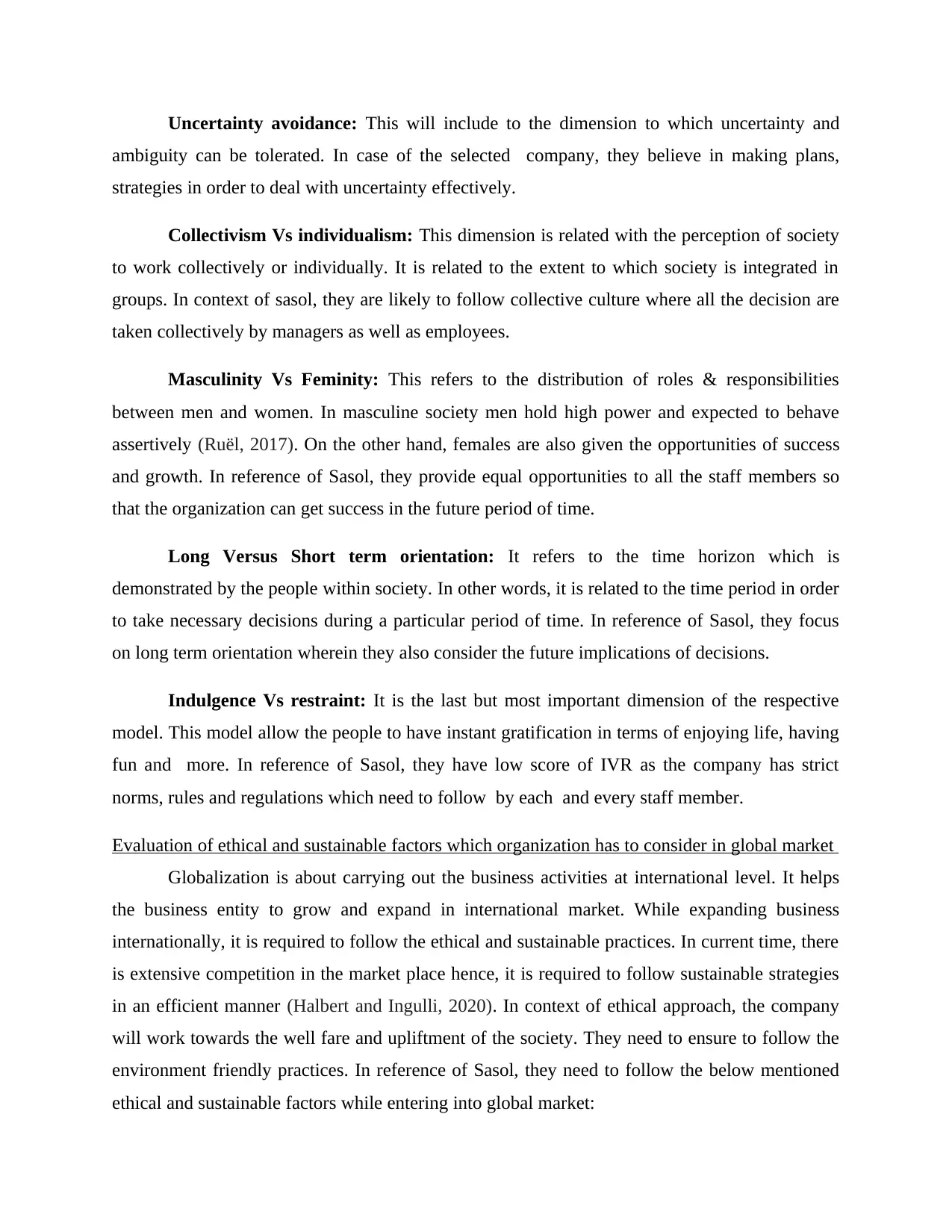
Uncertainty avoidance: This will include to the dimension to which uncertainty and
ambiguity can be tolerated. In case of the selected company, they believe in making plans,
strategies in order to deal with uncertainty effectively.
Collectivism Vs individualism: This dimension is related with the perception of society
to work collectively or individually. It is related to the extent to which society is integrated in
groups. In context of sasol, they are likely to follow collective culture where all the decision are
taken collectively by managers as well as employees.
Masculinity Vs Feminity: This refers to the distribution of roles & responsibilities
between men and women. In masculine society men hold high power and expected to behave
assertively (Ruël, 2017). On the other hand, females are also given the opportunities of success
and growth. In reference of Sasol, they provide equal opportunities to all the staff members so
that the organization can get success in the future period of time.
Long Versus Short term orientation: It refers to the time horizon which is
demonstrated by the people within society. In other words, it is related to the time period in order
to take necessary decisions during a particular period of time. In reference of Sasol, they focus
on long term orientation wherein they also consider the future implications of decisions.
Indulgence Vs restraint: It is the last but most important dimension of the respective
model. This model allow the people to have instant gratification in terms of enjoying life, having
fun and more. In reference of Sasol, they have low score of IVR as the company has strict
norms, rules and regulations which need to follow by each and every staff member.
Evaluation of ethical and sustainable factors which organization has to consider in global market
Globalization is about carrying out the business activities at international level. It helps
the business entity to grow and expand in international market. While expanding business
internationally, it is required to follow the ethical and sustainable practices. In current time, there
is extensive competition in the market place hence, it is required to follow sustainable strategies
in an efficient manner (Halbert and Ingulli, 2020). In context of ethical approach, the company
will work towards the well fare and upliftment of the society. They need to ensure to follow the
environment friendly practices. In reference of Sasol, they need to follow the below mentioned
ethical and sustainable factors while entering into global market:
ambiguity can be tolerated. In case of the selected company, they believe in making plans,
strategies in order to deal with uncertainty effectively.
Collectivism Vs individualism: This dimension is related with the perception of society
to work collectively or individually. It is related to the extent to which society is integrated in
groups. In context of sasol, they are likely to follow collective culture where all the decision are
taken collectively by managers as well as employees.
Masculinity Vs Feminity: This refers to the distribution of roles & responsibilities
between men and women. In masculine society men hold high power and expected to behave
assertively (Ruël, 2017). On the other hand, females are also given the opportunities of success
and growth. In reference of Sasol, they provide equal opportunities to all the staff members so
that the organization can get success in the future period of time.
Long Versus Short term orientation: It refers to the time horizon which is
demonstrated by the people within society. In other words, it is related to the time period in order
to take necessary decisions during a particular period of time. In reference of Sasol, they focus
on long term orientation wherein they also consider the future implications of decisions.
Indulgence Vs restraint: It is the last but most important dimension of the respective
model. This model allow the people to have instant gratification in terms of enjoying life, having
fun and more. In reference of Sasol, they have low score of IVR as the company has strict
norms, rules and regulations which need to follow by each and every staff member.
Evaluation of ethical and sustainable factors which organization has to consider in global market
Globalization is about carrying out the business activities at international level. It helps
the business entity to grow and expand in international market. While expanding business
internationally, it is required to follow the ethical and sustainable practices. In current time, there
is extensive competition in the market place hence, it is required to follow sustainable strategies
in an efficient manner (Halbert and Ingulli, 2020). In context of ethical approach, the company
will work towards the well fare and upliftment of the society. They need to ensure to follow the
environment friendly practices. In reference of Sasol, they need to follow the below mentioned
ethical and sustainable factors while entering into global market:
⊘ This is a preview!⊘
Do you want full access?
Subscribe today to unlock all pages.

Trusted by 1+ million students worldwide
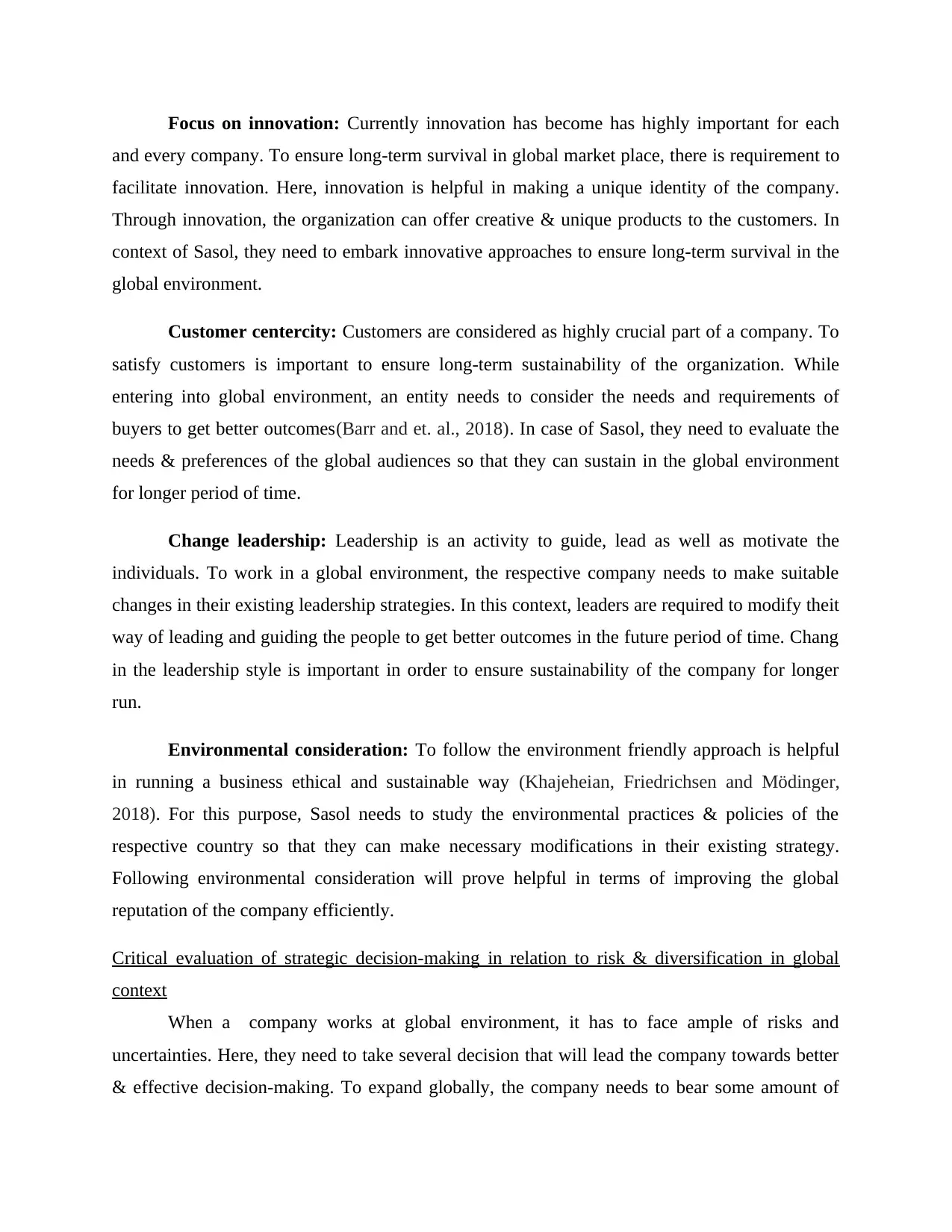
Focus on innovation: Currently innovation has become has highly important for each
and every company. To ensure long-term survival in global market place, there is requirement to
facilitate innovation. Here, innovation is helpful in making a unique identity of the company.
Through innovation, the organization can offer creative & unique products to the customers. In
context of Sasol, they need to embark innovative approaches to ensure long-term survival in the
global environment.
Customer centercity: Customers are considered as highly crucial part of a company. To
satisfy customers is important to ensure long-term sustainability of the organization. While
entering into global environment, an entity needs to consider the needs and requirements of
buyers to get better outcomes(Barr and et. al., 2018). In case of Sasol, they need to evaluate the
needs & preferences of the global audiences so that they can sustain in the global environment
for longer period of time.
Change leadership: Leadership is an activity to guide, lead as well as motivate the
individuals. To work in a global environment, the respective company needs to make suitable
changes in their existing leadership strategies. In this context, leaders are required to modify theit
way of leading and guiding the people to get better outcomes in the future period of time. Chang
in the leadership style is important in order to ensure sustainability of the company for longer
run.
Environmental consideration: To follow the environment friendly approach is helpful
in running a business ethical and sustainable way (Khajeheian, Friedrichsen and Mödinger,
2018). For this purpose, Sasol needs to study the environmental practices & policies of the
respective country so that they can make necessary modifications in their existing strategy.
Following environmental consideration will prove helpful in terms of improving the global
reputation of the company efficiently.
Critical evaluation of strategic decision-making in relation to risk & diversification in global
context
When a company works at global environment, it has to face ample of risks and
uncertainties. Here, they need to take several decision that will lead the company towards better
& effective decision-making. To expand globally, the company needs to bear some amount of
and every company. To ensure long-term survival in global market place, there is requirement to
facilitate innovation. Here, innovation is helpful in making a unique identity of the company.
Through innovation, the organization can offer creative & unique products to the customers. In
context of Sasol, they need to embark innovative approaches to ensure long-term survival in the
global environment.
Customer centercity: Customers are considered as highly crucial part of a company. To
satisfy customers is important to ensure long-term sustainability of the organization. While
entering into global environment, an entity needs to consider the needs and requirements of
buyers to get better outcomes(Barr and et. al., 2018). In case of Sasol, they need to evaluate the
needs & preferences of the global audiences so that they can sustain in the global environment
for longer period of time.
Change leadership: Leadership is an activity to guide, lead as well as motivate the
individuals. To work in a global environment, the respective company needs to make suitable
changes in their existing leadership strategies. In this context, leaders are required to modify theit
way of leading and guiding the people to get better outcomes in the future period of time. Chang
in the leadership style is important in order to ensure sustainability of the company for longer
run.
Environmental consideration: To follow the environment friendly approach is helpful
in running a business ethical and sustainable way (Khajeheian, Friedrichsen and Mödinger,
2018). For this purpose, Sasol needs to study the environmental practices & policies of the
respective country so that they can make necessary modifications in their existing strategy.
Following environmental consideration will prove helpful in terms of improving the global
reputation of the company efficiently.
Critical evaluation of strategic decision-making in relation to risk & diversification in global
context
When a company works at global environment, it has to face ample of risks and
uncertainties. Here, they need to take several decision that will lead the company towards better
& effective decision-making. To expand globally, the company needs to bear some amount of
Paraphrase This Document
Need a fresh take? Get an instant paraphrase of this document with our AI Paraphraser
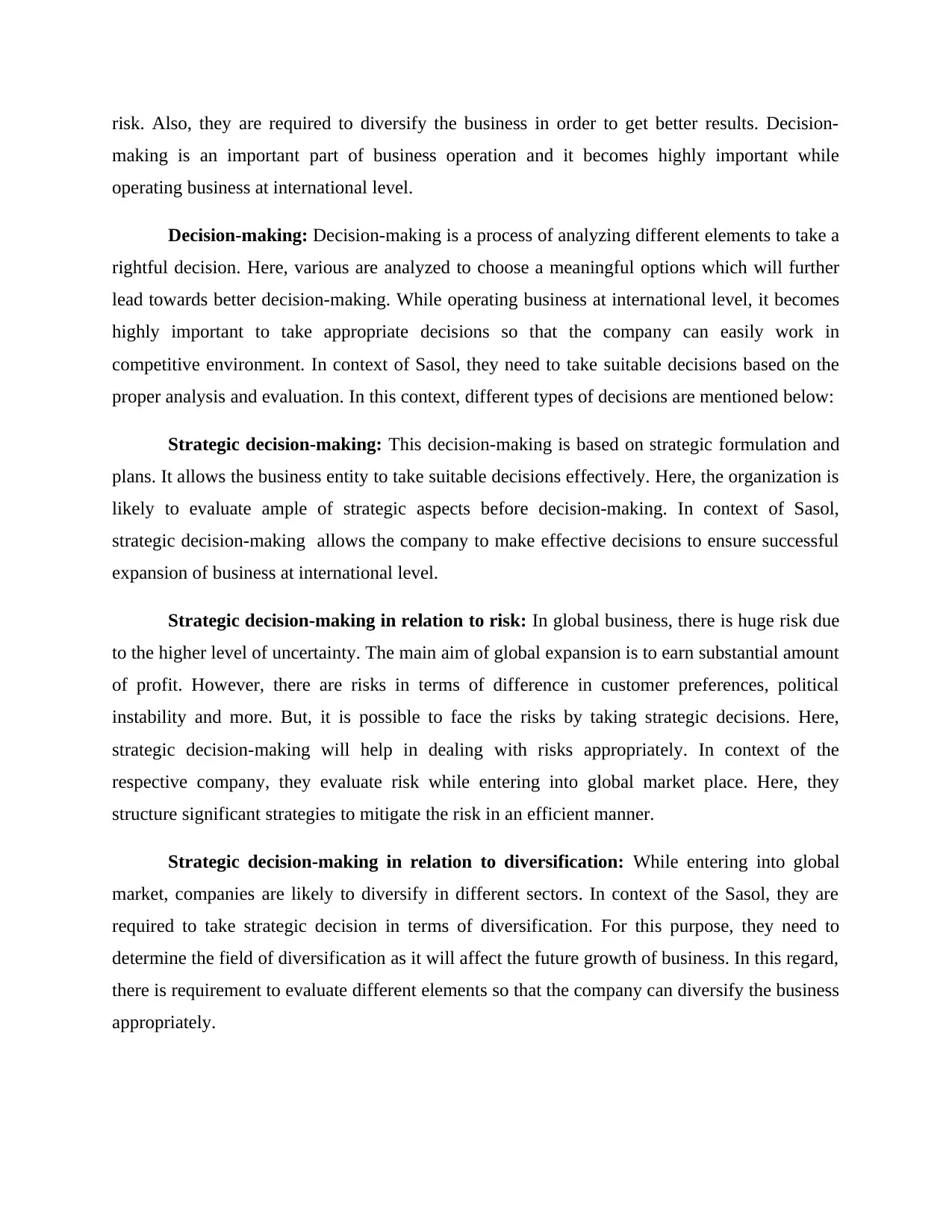
risk. Also, they are required to diversify the business in order to get better results. Decision-
making is an important part of business operation and it becomes highly important while
operating business at international level.
Decision-making: Decision-making is a process of analyzing different elements to take a
rightful decision. Here, various are analyzed to choose a meaningful options which will further
lead towards better decision-making. While operating business at international level, it becomes
highly important to take appropriate decisions so that the company can easily work in
competitive environment. In context of Sasol, they need to take suitable decisions based on the
proper analysis and evaluation. In this context, different types of decisions are mentioned below:
Strategic decision-making: This decision-making is based on strategic formulation and
plans. It allows the business entity to take suitable decisions effectively. Here, the organization is
likely to evaluate ample of strategic aspects before decision-making. In context of Sasol,
strategic decision-making allows the company to make effective decisions to ensure successful
expansion of business at international level.
Strategic decision-making in relation to risk: In global business, there is huge risk due
to the higher level of uncertainty. The main aim of global expansion is to earn substantial amount
of profit. However, there are risks in terms of difference in customer preferences, political
instability and more. But, it is possible to face the risks by taking strategic decisions. Here,
strategic decision-making will help in dealing with risks appropriately. In context of the
respective company, they evaluate risk while entering into global market place. Here, they
structure significant strategies to mitigate the risk in an efficient manner.
Strategic decision-making in relation to diversification: While entering into global
market, companies are likely to diversify in different sectors. In context of the Sasol, they are
required to take strategic decision in terms of diversification. For this purpose, they need to
determine the field of diversification as it will affect the future growth of business. In this regard,
there is requirement to evaluate different elements so that the company can diversify the business
appropriately.
making is an important part of business operation and it becomes highly important while
operating business at international level.
Decision-making: Decision-making is a process of analyzing different elements to take a
rightful decision. Here, various are analyzed to choose a meaningful options which will further
lead towards better decision-making. While operating business at international level, it becomes
highly important to take appropriate decisions so that the company can easily work in
competitive environment. In context of Sasol, they need to take suitable decisions based on the
proper analysis and evaluation. In this context, different types of decisions are mentioned below:
Strategic decision-making: This decision-making is based on strategic formulation and
plans. It allows the business entity to take suitable decisions effectively. Here, the organization is
likely to evaluate ample of strategic aspects before decision-making. In context of Sasol,
strategic decision-making allows the company to make effective decisions to ensure successful
expansion of business at international level.
Strategic decision-making in relation to risk: In global business, there is huge risk due
to the higher level of uncertainty. The main aim of global expansion is to earn substantial amount
of profit. However, there are risks in terms of difference in customer preferences, political
instability and more. But, it is possible to face the risks by taking strategic decisions. Here,
strategic decision-making will help in dealing with risks appropriately. In context of the
respective company, they evaluate risk while entering into global market place. Here, they
structure significant strategies to mitigate the risk in an efficient manner.
Strategic decision-making in relation to diversification: While entering into global
market, companies are likely to diversify in different sectors. In context of the Sasol, they are
required to take strategic decision in terms of diversification. For this purpose, they need to
determine the field of diversification as it will affect the future growth of business. In this regard,
there is requirement to evaluate different elements so that the company can diversify the business
appropriately.
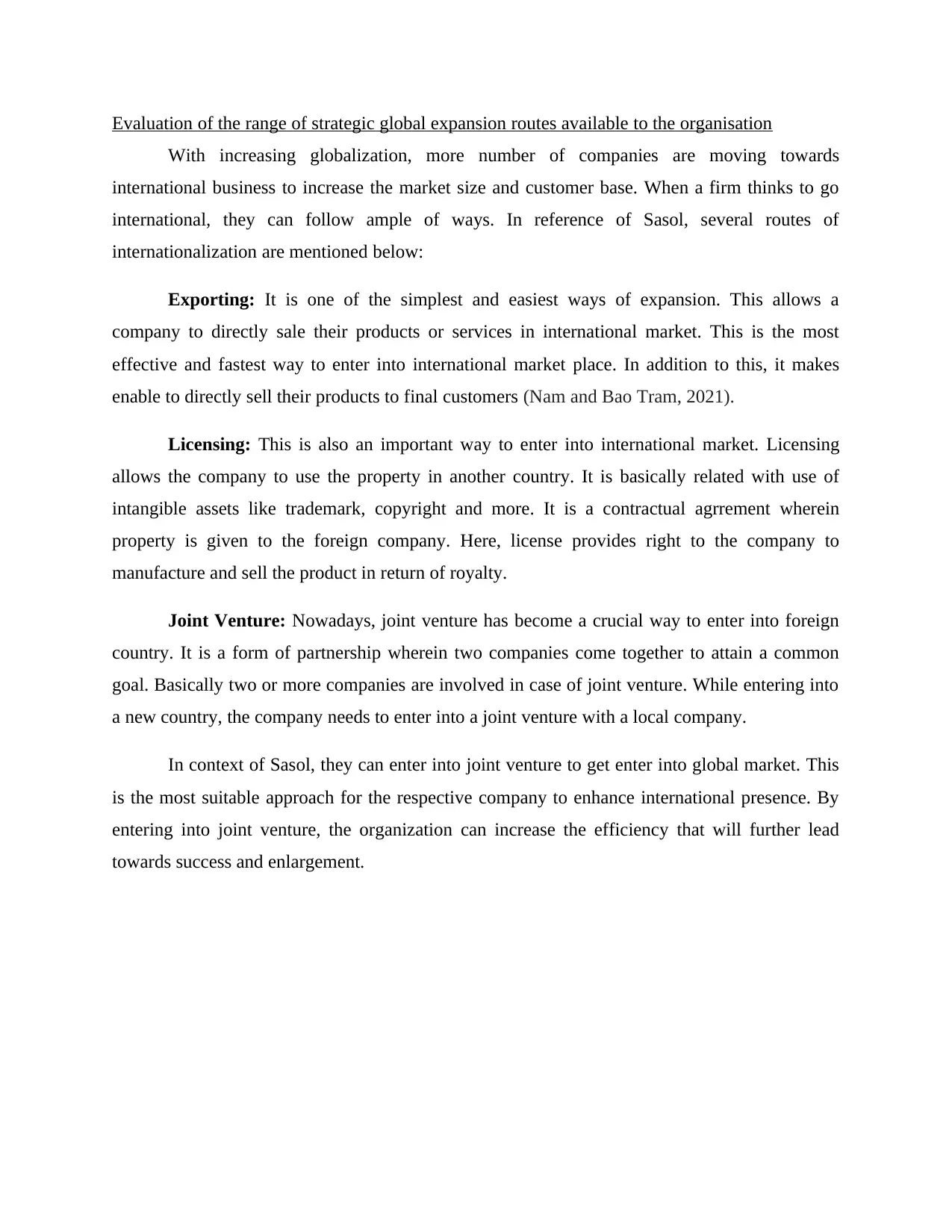
Evaluation of the range of strategic global expansion routes available to the organisation
With increasing globalization, more number of companies are moving towards
international business to increase the market size and customer base. When a firm thinks to go
international, they can follow ample of ways. In reference of Sasol, several routes of
internationalization are mentioned below:
Exporting: It is one of the simplest and easiest ways of expansion. This allows a
company to directly sale their products or services in international market. This is the most
effective and fastest way to enter into international market place. In addition to this, it makes
enable to directly sell their products to final customers (Nam and Bao Tram, 2021).
Licensing: This is also an important way to enter into international market. Licensing
allows the company to use the property in another country. It is basically related with use of
intangible assets like trademark, copyright and more. It is a contractual agrrement wherein
property is given to the foreign company. Here, license provides right to the company to
manufacture and sell the product in return of royalty.
Joint Venture: Nowadays, joint venture has become a crucial way to enter into foreign
country. It is a form of partnership wherein two companies come together to attain a common
goal. Basically two or more companies are involved in case of joint venture. While entering into
a new country, the company needs to enter into a joint venture with a local company.
In context of Sasol, they can enter into joint venture to get enter into global market. This
is the most suitable approach for the respective company to enhance international presence. By
entering into joint venture, the organization can increase the efficiency that will further lead
towards success and enlargement.
With increasing globalization, more number of companies are moving towards
international business to increase the market size and customer base. When a firm thinks to go
international, they can follow ample of ways. In reference of Sasol, several routes of
internationalization are mentioned below:
Exporting: It is one of the simplest and easiest ways of expansion. This allows a
company to directly sale their products or services in international market. This is the most
effective and fastest way to enter into international market place. In addition to this, it makes
enable to directly sell their products to final customers (Nam and Bao Tram, 2021).
Licensing: This is also an important way to enter into international market. Licensing
allows the company to use the property in another country. It is basically related with use of
intangible assets like trademark, copyright and more. It is a contractual agrrement wherein
property is given to the foreign company. Here, license provides right to the company to
manufacture and sell the product in return of royalty.
Joint Venture: Nowadays, joint venture has become a crucial way to enter into foreign
country. It is a form of partnership wherein two companies come together to attain a common
goal. Basically two or more companies are involved in case of joint venture. While entering into
a new country, the company needs to enter into a joint venture with a local company.
In context of Sasol, they can enter into joint venture to get enter into global market. This
is the most suitable approach for the respective company to enhance international presence. By
entering into joint venture, the organization can increase the efficiency that will further lead
towards success and enlargement.
⊘ This is a preview!⊘
Do you want full access?
Subscribe today to unlock all pages.

Trusted by 1+ million students worldwide
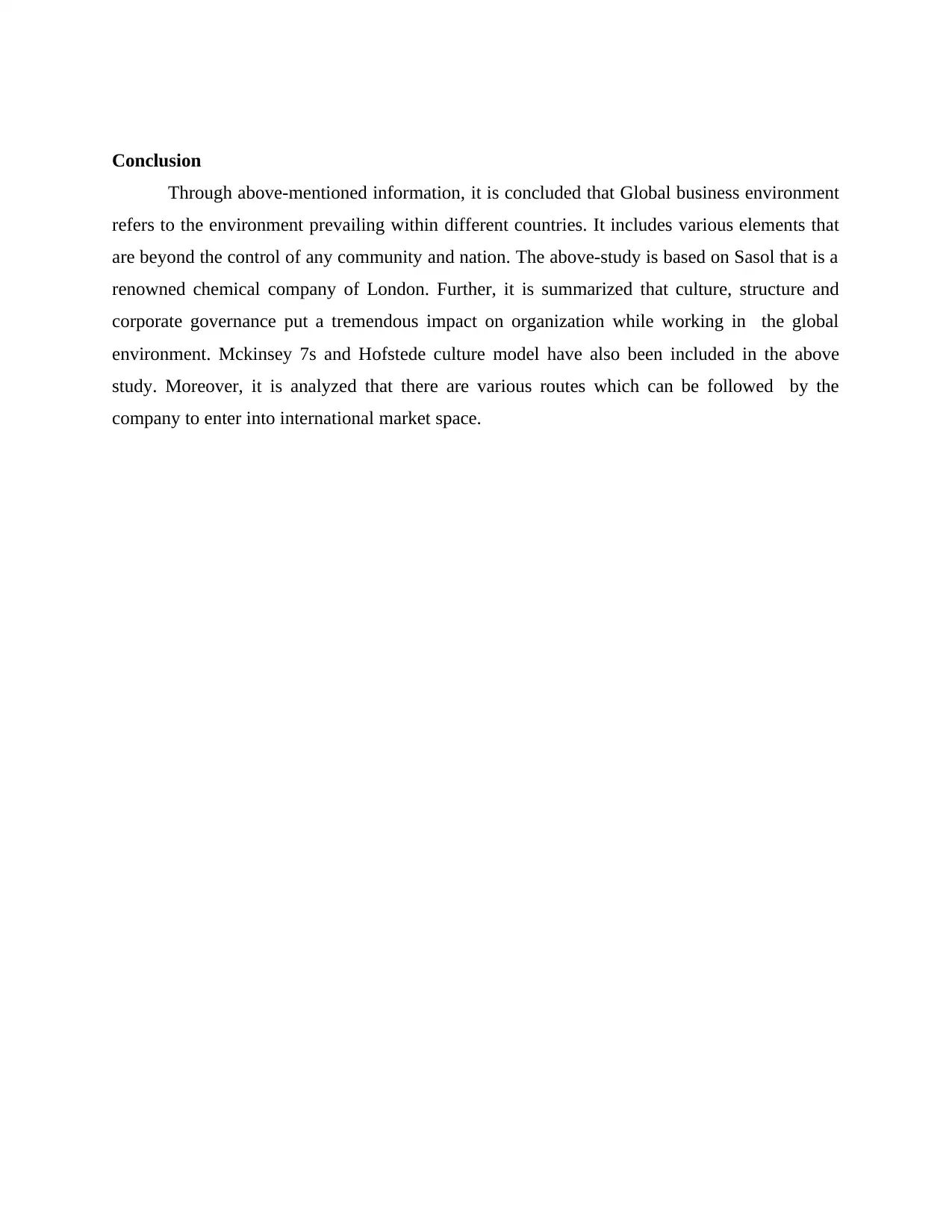
Conclusion
Through above-mentioned information, it is concluded that Global business environment
refers to the environment prevailing within different countries. It includes various elements that
are beyond the control of any community and nation. The above-study is based on Sasol that is a
renowned chemical company of London. Further, it is summarized that culture, structure and
corporate governance put a tremendous impact on organization while working in the global
environment. Mckinsey 7s and Hofstede culture model have also been included in the above
study. Moreover, it is analyzed that there are various routes which can be followed by the
company to enter into international market space.
Through above-mentioned information, it is concluded that Global business environment
refers to the environment prevailing within different countries. It includes various elements that
are beyond the control of any community and nation. The above-study is based on Sasol that is a
renowned chemical company of London. Further, it is summarized that culture, structure and
corporate governance put a tremendous impact on organization while working in the global
environment. Mckinsey 7s and Hofstede culture model have also been included in the above
study. Moreover, it is analyzed that there are various routes which can be followed by the
company to enter into international market space.
Paraphrase This Document
Need a fresh take? Get an instant paraphrase of this document with our AI Paraphraser
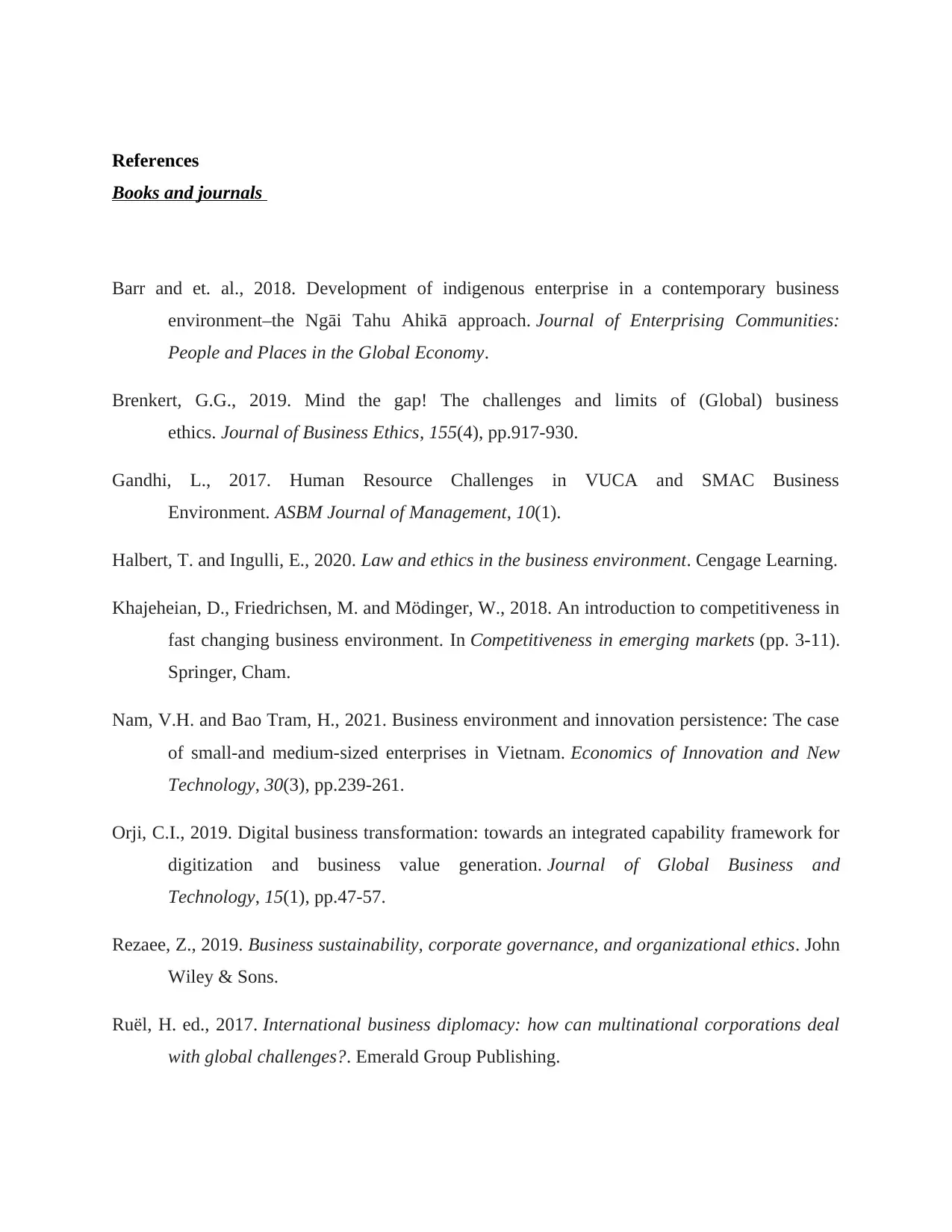
References
Books and journals
Barr and et. al., 2018. Development of indigenous enterprise in a contemporary business
environment–the Ngāi Tahu Ahikā approach. Journal of Enterprising Communities:
People and Places in the Global Economy.
Brenkert, G.G., 2019. Mind the gap! The challenges and limits of (Global) business
ethics. Journal of Business Ethics, 155(4), pp.917-930.
Gandhi, L., 2017. Human Resource Challenges in VUCA and SMAC Business
Environment. ASBM Journal of Management, 10(1).
Halbert, T. and Ingulli, E., 2020. Law and ethics in the business environment. Cengage Learning.
Khajeheian, D., Friedrichsen, M. and Mödinger, W., 2018. An introduction to competitiveness in
fast changing business environment. In Competitiveness in emerging markets (pp. 3-11).
Springer, Cham.
Nam, V.H. and Bao Tram, H., 2021. Business environment and innovation persistence: The case
of small-and medium-sized enterprises in Vietnam. Economics of Innovation and New
Technology, 30(3), pp.239-261.
Orji, C.I., 2019. Digital business transformation: towards an integrated capability framework for
digitization and business value generation. Journal of Global Business and
Technology, 15(1), pp.47-57.
Rezaee, Z., 2019. Business sustainability, corporate governance, and organizational ethics. John
Wiley & Sons.
Ruël, H. ed., 2017. International business diplomacy: how can multinational corporations deal
with global challenges?. Emerald Group Publishing.
Books and journals
Barr and et. al., 2018. Development of indigenous enterprise in a contemporary business
environment–the Ngāi Tahu Ahikā approach. Journal of Enterprising Communities:
People and Places in the Global Economy.
Brenkert, G.G., 2019. Mind the gap! The challenges and limits of (Global) business
ethics. Journal of Business Ethics, 155(4), pp.917-930.
Gandhi, L., 2017. Human Resource Challenges in VUCA and SMAC Business
Environment. ASBM Journal of Management, 10(1).
Halbert, T. and Ingulli, E., 2020. Law and ethics in the business environment. Cengage Learning.
Khajeheian, D., Friedrichsen, M. and Mödinger, W., 2018. An introduction to competitiveness in
fast changing business environment. In Competitiveness in emerging markets (pp. 3-11).
Springer, Cham.
Nam, V.H. and Bao Tram, H., 2021. Business environment and innovation persistence: The case
of small-and medium-sized enterprises in Vietnam. Economics of Innovation and New
Technology, 30(3), pp.239-261.
Orji, C.I., 2019. Digital business transformation: towards an integrated capability framework for
digitization and business value generation. Journal of Global Business and
Technology, 15(1), pp.47-57.
Rezaee, Z., 2019. Business sustainability, corporate governance, and organizational ethics. John
Wiley & Sons.
Ruël, H. ed., 2017. International business diplomacy: how can multinational corporations deal
with global challenges?. Emerald Group Publishing.
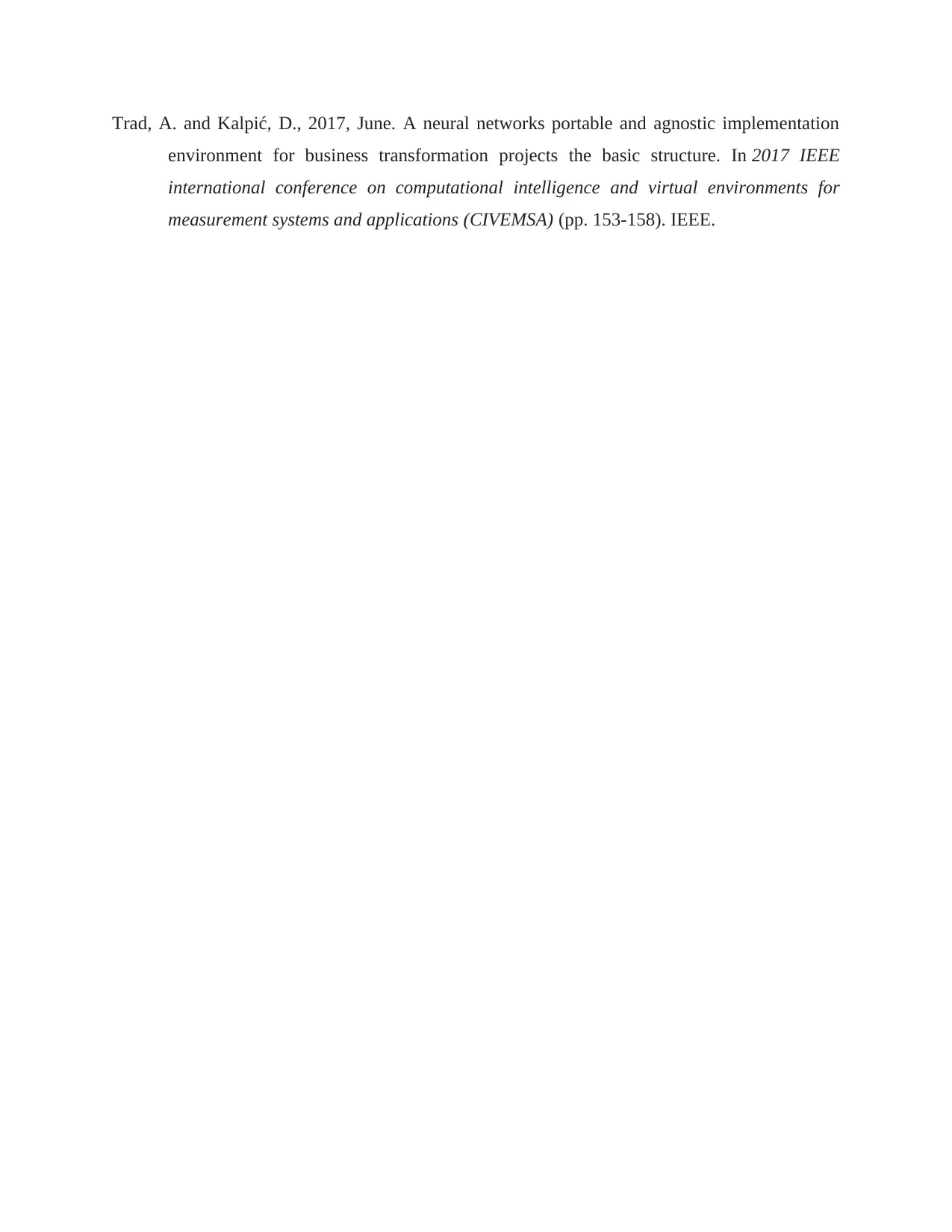
Trad, A. and Kalpić, D., 2017, June. A neural networks portable and agnostic implementation
environment for business transformation projects the basic structure. In 2017 IEEE
international conference on computational intelligence and virtual environments for
measurement systems and applications (CIVEMSA) (pp. 153-158). IEEE.
environment for business transformation projects the basic structure. In 2017 IEEE
international conference on computational intelligence and virtual environments for
measurement systems and applications (CIVEMSA) (pp. 153-158). IEEE.
⊘ This is a preview!⊘
Do you want full access?
Subscribe today to unlock all pages.

Trusted by 1+ million students worldwide
1 out of 12
Related Documents
Your All-in-One AI-Powered Toolkit for Academic Success.
+13062052269
info@desklib.com
Available 24*7 on WhatsApp / Email
![[object Object]](/_next/static/media/star-bottom.7253800d.svg)
Unlock your academic potential
Copyright © 2020–2026 A2Z Services. All Rights Reserved. Developed and managed by ZUCOL.



